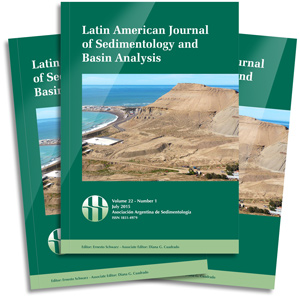Assessment of wash load transport in the Araguaia River (Aruanã Gauge Station), central Brazil
Palabras clave:
Wash load; Deforestation; Sediment transport; Araguaia; Central BrazilResumen
With an area close to 377,000 km2 and a mean annual discharge of ~ 6,420 m3 s-1 the Araguaia River is the main river draining the central highlands of Brazil. The Araguaia Rivers is a particularly sandy anabranching system that has been suffering geomorphologic and sedimentary changes because of the effect of high rates of deforestation during the last decades. Little is known, however, on the amount of wash load transport. We will present the first relatively systematic results on wash load transport for the Araguaia River at the Aruanã gauge station. The drainage area at Aruanã is 77,000 km2 and the mean annual discharge is ~1,200 m3 s-1. A total of 140 samples from 20 field surveys were analyzed and the wash load transport was estimated. We calculated that from 2001-2007 the average annual transport oscillated between 8 Mt yr-1 and 6 Mt yr-1. An interesting aspect that makes the Araguaia unique when compared to other large alluvial rivers of Brazil is the relation between sandy load and wash load. The Araguaia at Aruanã carries up to ~57% of the total sediment load as sandy load. We can now conclude that wash load just represents near 43 to 49% of the total sediment load in this system. Our results demonstrate that previous works overestimated the total wash load transported by the Araguaia. Taking into account that these are the first systematic results on wash load transport in the Araguaia, proposed human interventions in this system affecting sediment flows such as dams can be extremely harmful for the fluvial system. A more systematic analysis of sediment transport and an integrated and multidisciplinary plan of basin management must be done so that the detrimental effects of these human interventions will be understood.
Citas
Amsler, M. and H. Prendes, 2000. Transporte de sedimentos y procesos fluviales asociados. In C. Paoli and M. Schreider (Eds.), El Río Paraná en su tramo medio. Centro de Publicaciones Universitarias, Universidad Nacional del Litoral, Santa Fe, Argentina, 233-306.
Aquino, S., E. Latrubesse and E. Souza, 2008. O Regime hidrológico do Rio Araguaia: sua caracterização, importancia e particularidades para a manutenção dos principais sistemas
aquáticos do Brasil Central. Acta Scientiarum 30:361-369.
Klink, C.A. and R.B. Machado, 2005. Conservation of the Brazilian Cerrado. Conservation Biology 19:7.
Ferreira, M.E., L.G. Ferreira, E.M. Latrubesse and F. Miziara, 2008. High Resolution Remote Sensing based Quantification of the Remnant Vegetation Cover in the Araguaia River Basin,
Central Brazil. Geoscience and Remote Sensing Symposium,2008. IGARSS 2008. IEEE International 4:739-741.
Latrubesse, E., 2008. Patterns of Anabranching channels: the ultimate end-member adjustments of mega-rivers. Geomorphology, 101:130-145.
Latrubesse, E. and J. Stevaux, 2002. Geomorphology and Environmental aspects of the Araguaia fluvial basin, Brazil. Zeitschrift Fur Geomorphologie 129:109-127.
Latrubesse, E. and Stevaux, J.C. 2006. Características fisicobióticas e problemas ambientais asociados à planicie aluvial do Rio Araguaia, Brasil central. Geociências-UNG:67-75
Latrubesse, E., J.C. Stevaux and R. Sinha, 2005. Tropical Rivers, Geomorphology 70:137-206.
Latrubesse E., M. Amsler, R.P. Morais and S. Aquino, 2009. The Geomorphologic response of a large pristine alluvial river to tremendous deforestation in the South American tropics: the case of the Araguaia River. Geomorphology 113:239-252.
Orfeo, O. and J.C. Stevaux, 2002. Hydraulic and morphological characteristics of middle and upper reaches of the Paraná River (Agentina and Brazil). Geomorphology, 44:309-322.
Prado, R.P., E. Latrubesse and S. Aquino, 2008. Controles abioticos da vegetação na planicie aluvial do Rio Araguaia, Brasil Central. Acta Scientiarum 30:411-421.
Prado, R., L.G. Oliveira, E. Latrubesse and R. Pinheiros, 2005. Análise Limnológica dos parâmetros morfométricos dos sistemas lacustres da planície aluvial do Médio Rio Araguaia. Acta Scientiarium, 27:203-213.
Ramonell, C., M.L. Amsler and H.A. Toniolo, 2000. Geomorfología del Cauce Principal del Paraná (Capítulo 4). In: El Río Paraná en su Tramo Medio. Contribución a su conocimiento y prácticas
ingenieriles en un gran río de llanura. Tomo 1. Centro de Publicaciones de la Universidad Nacional del Litoral. Santa Fe. Argentina, p. 173-232.
Ramonell, C.G., M.L. Amsler and H.A. Toniolo, 2002. Shifting Modes of the Paraná River Thalweg in its Middle-Lower Reaches. Zeitchrift fur Geomorphologie. Suppl.-Bd. 129:129-142.
Sano E.E., R.J.L. Rosa and L.G. Ferreira, 2008. Semidetailed land use mapping in the Cerrado. Empressa Brasileira de Pesquisa Agropecuária-EMBRAPA 43:153-156.
Werneck Lima, J.E.F., P.M.C. Dos Santos, N.O. Carvalho and E.M. da Silva, 2003. Araguaia-Tocantins: Diagnóstico do Fluxo de Sedimentos em Suspensão na Bacia. Brasília: Embrapa,
ANEEL, ANA. 116p.
Descargas
Publicado
Cómo citar
Número
Sección
Licencia

Esta obra está bajo una licencia internacional Creative Commons Atribución-NoComercial 4.0.




